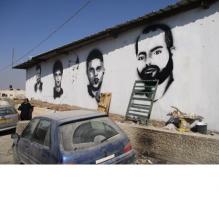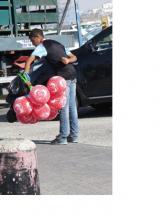Qalandiya
An acquaintance who’d never been there asked me to describe the routine at Qalandiya, and I, who had been there, didn’t do so.
What can I tell someone who hadn’t been there, or someone who had?
About the memorial wall filling with portraits of the murdered residents of the refugee camp, the wall which isn’t long enough for them all, nor thick enough to absorb all the sorrow and pain?

Or about the medical teams lugging patients between stretchers and ambulances on their way to the hospital in a procedure that’s always the same and always according to the same rules and shadowed by the same weapons?
What isn’t the same is the face of the particular patient, their name, their illness, like the man from Tulkarm who arrived connected to a blood-pressure monitor lest his pulse stop, an oxygen tank beside him lest his lungs give out, “his heart is in a critical condition and he has to reach Makassed Hospital very quickly” said the member of the medical team, but very-quickly took a while.
Because here, the place whose routine my friend wanted to hear about, following procedures is more important than human life.

And perhaps the routine are the children, some young, some less young, who push their skinny bodies through the cluster of vehicles in the never-ending traffic jam at the entrance to the checkpoint, wiping windshields with a filthy damp rag and extending a thin hand to the driver to receive a few shekels? Or others like them knocking on the side windows of the same vehicles, offering whatever they can for sale?
Perhaps the routine is the Civil Administration personnel from Beit El who once again – no one any longer counts how many times – destroyed Abdallah Tamimi’s fruit stand?
personnel from Beit El who once again – no one any longer counts how many times – destroyed Abdallah Tamimi’s fruit stand?
Or the conversations between and with people and statements such as:

- “The people here are better, not like those who burned the family in Duma, in Hebron one of us took the ones who got lost to his home, protected them and also gave them water…”
- “What happened in Hebron seemed strange to me, I couldn’t understand how they could have been settlers but they didn’t have guns…”
So that’s that, I haven’t any answer, not because I don’t want to answer, but because I don’t know how to answer.
